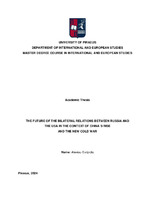The future of the bilateral relations between Russia and the USA, in the context of China's rise and the new Cold War

Master Thesis
Συγγραφέας
Alexiou, Evripidis
Αλεξίου, Ευριπίδης
Ημερομηνία
2024Προβολή/
Λέξεις κλειδιά
Balance of power ; Sphere of influence ; Asymmetrical growth ; Thucydides' trapΠερίληψη
This thesis aims to explore and predict the evolving relationship between the United States of America and the Russian Federation, with specific consideration given to the rising influence of the People's Republic of China and its growing antagonism towards American interests. The analysis is primarily based on the Realist school of thought, although alternative methodologies can also yield similar conclusions. This economic expansion has contributed to China's emergence as a challenging force. Simultaneously, Russia, dissatisfied with being treated as a diminished power, has found common ground with China due to their shared grievances towards American dominance. However, examining their history reveals that the current alliance is an exception rather than the norm. The two have a long history of animosity, dating back to the mid-nineteenth century when Moscow seized Chinese territory. Nevertheless, as it often happens, old enemies can transition into being allies, or at least collaborators in certain world affairs, in which they may have mutual benefits. As it stands, they are both opposed to the United States, the West, and the are desirous of a different world order. Their old rivalries seem to pale in comparison with the potential gains of continuing, and even expanding their current informal entente. It is unlikely that the situation will see and major change in the medium-term, let alone the short-term. In the long run, it is possible that they may choose to maintain a more neutral attitude to each other, but it is much more likely that nothing will change. The Kremlin and Beijing ever becoming enemies is astronomically unlikely, barring extensive development in world affairs.

